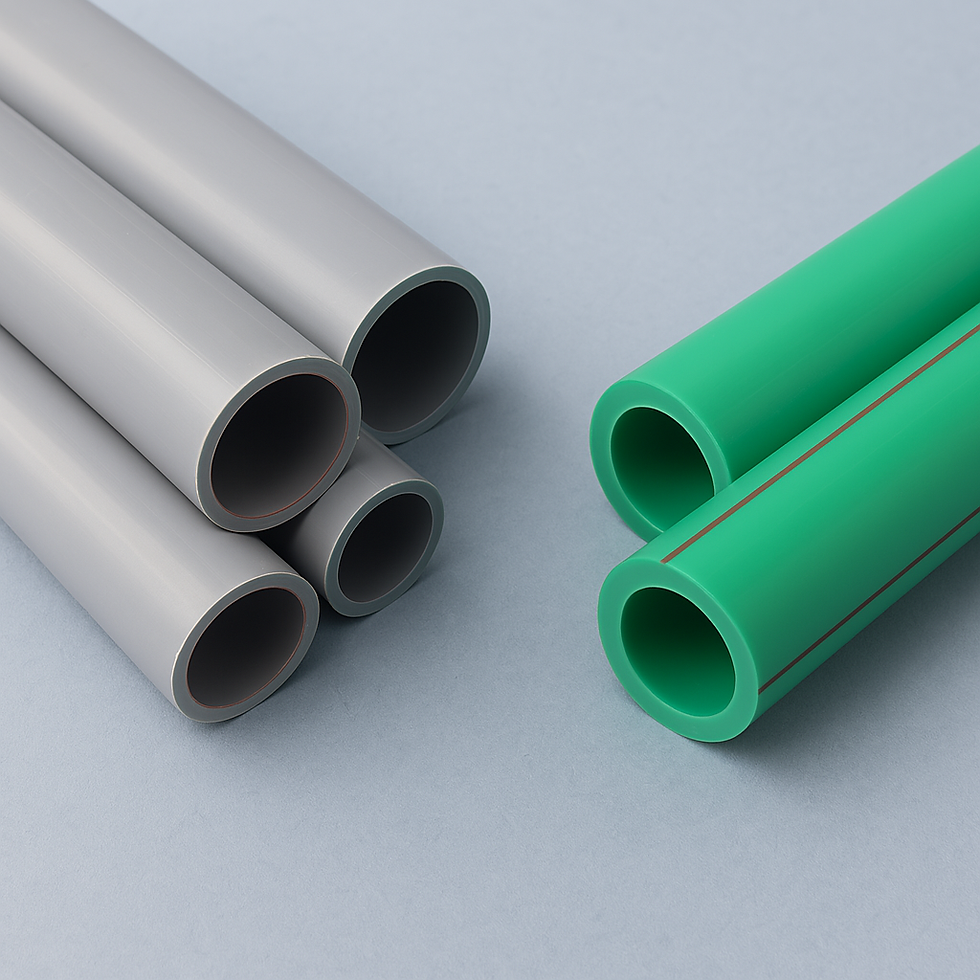UPVC Pipes vs. CPVC Pipes: Which is Right for Your Plumbing Needs?
- Adamjee DuraBuilt
- Aug 7, 2023
- 3 min read

The choices between UPVC (Unplasticized Polyvinyl Chloride) pipes and CPVC (Chlorinated Polyvinyl Chloride) pipes can be quite important when choosing the proper plumbing pipes for your project. Both materials have specific characteristics and advantages, so it's crucial to understand how they differ in order to make a decision that meets your plumbing requirements. The properties of UPVC pipes and CPVC pipes will be compared in this article to help you choose which one is better suited to your individual needs.
UPVC Pipes: Strength and Durability
UPVC pipes are recognized for their outstanding strength and durability since they are made from stiff, unplasticized PVC. They are appropriate for both cold and hot water distribution systems and are built to resist high-pressure applications. Because of their superior resistance to temperature changes, UPVC pipes are a flexible choice for a variety of plumbing tasks. The fact that they are non-corrosive ensures their durability and resistance to rust, scale, and other harmful chemicals. Additionally, UPVC pipes have great insulating qualities that help to prevent heat loss and increase the efficiency of the transmission of hot water. Additionally, the smooth inside surface of these pipes reduces friction and avoids mineral buildup, assuring a constant flow of water and lowering the possibility of clogs.
UPVC Pipes: Cost-Effectiveness and Easy Installation
The reasonable price of UPVC pipes is one of their main benefits. UPVC pipes are typically less expensive than CPVC pipes and other materials like copper or galvanized steel, making them a popular option for plumbing projects with limited budgets. Additionally, because of how lightweight they are, installation labor expenses are decreased during transit and handling. Additionally, UPVC pipes are simple to cut and join using solvent cement or threaded fittings, making installation easier for both licensed plumbers and do-it-yourselfers. Their adaptability to numerous connection techniques increases their versatility in many applications.
CPVC Pipes: Enhanced Flexibility and Heat Resistance
However, CPVC pipes, which are created by mixing PVC with chlorine, offer more flexibility and heat resistance. Due to their greater durability than UPVC pipes, CPVC pipes are perfect for hot water delivery applications. Plumbing systems in homes and businesses that need to distribute hot water, such as those for water heaters, showers, and other appliances, are best served by CPVC pipes. Their acceptance in such circumstances is largely a result of their capacity to deal with high-temperature fluids and maintain their shape under pressure. Additionally, CPVC pipes have exceptional corrosion resistance, ensuring lifespan and dependability under challenging water conditions.
CPVC Pipes: Chemical Compatibility and Fire Resistance
The outstanding chemical compatibility of CPVC pipes is one of their main benefits. They resist damage or deterioration from a wide range of chemicals, including acids, alkalis, and other corrosive compounds. For industrial installations where the plumbing system may come into touch with harsh chemicals, CPVC pipes are a preferable option. Furthermore, CPVC pipes are excellent for installations where fire safety is a concern because of their strong fire resistance. CPVC pipes offer an additional layer of safety and protection in the event of fire events since they are self-extinguishing and do not foster combustion.
Application Specific Considerations
The individual needs of your plumbing project must be taken into account while deciding between UPVC pipes and CPVC pipes. Due to their affordability and durability, UPVC pipes may be the best option for drainage and low-pressure applications, cold water supply systems, and low-pressure applications. On the other hand, CPVC pipes provide essential heat resistance and flexibility if your project entails conveying hot water, especially in residential and commercial structures. Additionally, CPVC pipes are a better choice because of their chemical compatibility if your plumbing system must be exposed to strong chemicals.
Environmental Considerations
In comparison to conventional metal pipes, UPVC and CPVC are both eco-friendly options. When they approach the end of their useful lives, they can be recycled, which lessens their environmental impact. Additionally, because they are lightweight, they require less energy to transport during both production and installation. The use of UPVC or CPVC pipes for your plumbing requirements is in line with ecological principles and reduces the planet's overall carbon impact.
In conclusion, a thorough evaluation of your unique plumbing requirements should guide your choice between UPVC pipes and CPVC pipes. UPVC pipes are appropriate for a variety of applications because of their strength, longevity, and affordability. On the other hand, CPVC pipes offer improved flexibility, chemical compatibility, fire resistance, and heat resistance, which makes them a great option for hot water supply and industrial applications. You can confidently choose the best option for ensuring a dependable and effective plumbing system for your project by being aware of the distinctive qualities of each type and talking with plumbing experts.












Comments